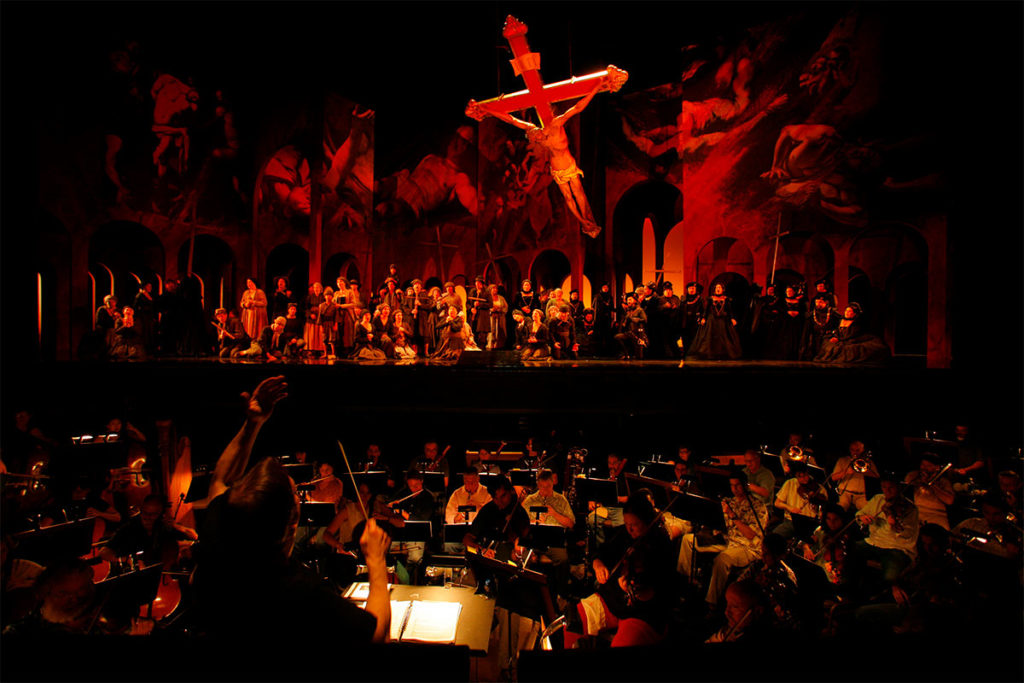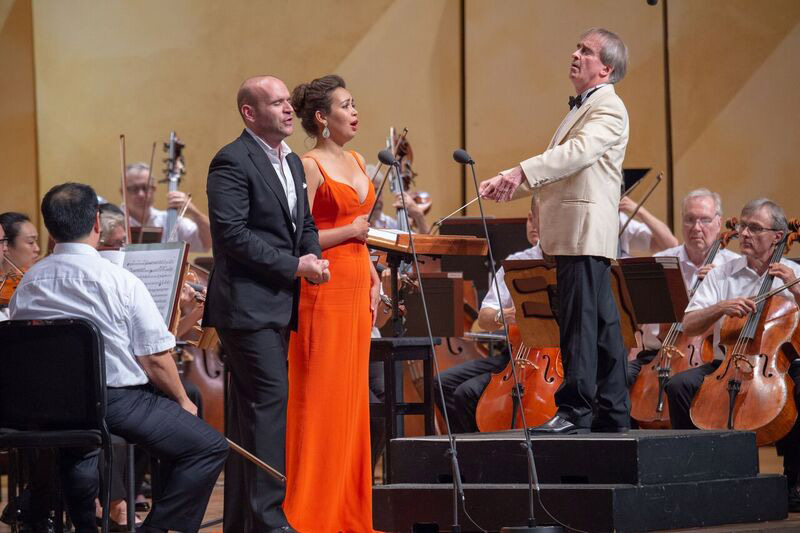James Conlon is a having a very Verdi moment.
The eminent 68-year-old American conductor will lead 39 performances of the Italian composer’s works in 2018-19, reaching his 500th Verdi performance overall. Conlon’s season starts Sept. 22 at the Los Angeles Opera, where he has been music director since 2006. “This year, for various reasons, just has an extraordinary density of (Verdi),” he said by telephone from L.A.
The exact date and place of that 500th performance will be announced later this year: “This is just one more, but a very special one. I don’t think about the number of performances I do, but it is nevertheless a significant landmark.” Conlon, who also serves as principal conductor of the Orchestra Sinfonica Nazionale della Rai in Turin, Italy, includes the composer’s Requiem on the list because it is so operatic in nature.
.
Giuseppe Verdi (1813-1901) ranks among the most produced operatic composers of all time. Among his 28 operas are some of the all-time audience favorites, including La Traviata, Il Trovatore, and Rigoletto. Conlon, who served as principal conductor of the Paris Opera in 1995-2004, ranks Verdi – along with Beethoven, Mahler, Mozart, and Wagner – among the composers who mean the most to him, the ones he believes he couldn’t live without.
“Verdi is fundamental to me,” he said, “not because he is an operatic composer but because he is a great composer and, in my opinion, a unique and great human being. So, for me, it’s all of a piece in his case. There are other composers we know who were perfectly dreadful human beings. He was not.”
When Conlon was eleven years old, he attended a performance of La Traviata, which he said struck like a lightning bolt, making him fall instantly in love with the genre. “So, for me to even think about classical music without thinking of Verdi is impossible,” he said.
Verdi has been part of his life ever since. Growing up in New York in the 1960s, Conlon was able to hear what he called a “golden age of singers” in some of Verdi’s most beloved roles, and he has made a point throughout his career of reading all the books, articles, and other studies on the composer that he could get his hands on.
But nothing was more important than his informal studies beginning in the mid-1970s with Dick Marzollo. The little-known Italian vocal coach and conductor was born in 1900 and gave Conlon an important link back to the decades after Verdi’s death. Marzollo was an assistant to Arturo Toscaniniand collaborated with such composers as Pietro Mascagni, Ruggero Leoncavallo, and Riccardo Zandonai. In addition, he worked with such noted singers of his time as Licia Albanese, Beniamino Gigli, and Magda Olivero. Marzollo helped Conlon understand how much vocal and performance styles had changed since Verdi’s time.
“Unfortunately, he did not have a big career as a conductor,” Conlon said, “which I suspect was a result of his uncompromising personality in an era when things were changing. But I sought out his knowledge. Marzollo lived until 1991. He and his entire family treated me as a member, and I had seventeen wonderful years to pick his brain.”
Much has been written about Verdi, but for Conlon, the two essential aspects of the composer’s operas are their “enormous humanity” and universal appeal. His works require no preparation on the part of listeners. “You don’t have to go to school, you don’t have to study the music, you don’t have to be a mathematician,” the conductor said. “It suffices to be in touch with one’s own emotions to love Verdi and to be moved by Verdi. And that’s why I think it appeals so universally, because we all have those human emotions.”
Here is a rundown of Conlon’s Verdi performances in 2018-19:In general, Verdi’s operas are deeply expressive. They can also be deeply pessimistic. The composer believed that forces greater than ourselves – the state, inner demons, destiny, and death – will eventually overwhelm us. But at the same time, he portrays characters in valiant battles against those elements and believed that validation comes with engagement in those conflicts. “We are more noble because we struggle with these forces that we know will subdue us,” Conlon said. “Somehow, I feel that Verdi must have felt that not to participate in that struggle, to ignore that struggle or to suppress the reality of that struggle is somehow not to participate in life.”
- Los Angeles Opera, Sept. 22-Oct. 14, Don Carlo (Don Carlo, Ramón Vargas; Elisabeth de Valois, Ana María Martínez; Princess Eboli, Anna Smirnova; Rodrigo, Plácido Domingo; King Philip II, Sept. 22-29, Ferruccio Furlanetto, and King Philip II, Oct. 4-14, Alexander Vinogradov); and June 1-22, La Traviata (Violetta Valery, Adela Zaharia; Alfredo Germont, June 1-13, Rame Lahaj, Alfredo Germont, June 16-22, Charles Castronovo; Giorgio Germont, June 1-13, Vitaliy Bilyy, and Giorgio Germont, June 16-22, Igor Golovatenko). The conductor is opening the company’s season with the former and closing it with the latter. They are the same two works he conducted there during his first weekend on the podium as music director. “It is a total coincidence that they both wound up as bookends of this season,” he said.
- Orchestra Sinfonica Nazionale della Rai, Turin, Oct. 25-26, Requiem (soprano Anna Pirozzi, contralto Marianna Pizzolato, tenor Saimir Pirgu, and bass Dmitry Belosseslkiy).
- Vienna State Opera, Jan. 23-30, 2019, Falstaff (Falstaff, Carlos Álvarez; Ford, Simon Keenlyside; Fenton, Jinxu Xiahou; Alice Ford, Olga Bezsmertna, and Nannetta, Hila Fahima); and May 5-14, 2019, Macbeth (Macbeth, George Petean; Banquo, Ferruccio Furlanetto; Lady Macbeth, Tatiana Serjan, and Macduff, Jinxu Xiahou).
- Teatro Real, Madrid, July 14-20, 2019, Giovanna d’Arco (Joan of Arc), concert version(Carlo VII, Michael Fabiano; Giacomo, Plácido Domingo; Giovanna, Carmen Giannattasio; Delil, Moisés Marín, and Talbot, Simón Orfila).
There is also one more production, not yet announced.
So far in his career, Conlon has conducted 15 of Verdi’s operas plus the Requiem. His first came when he was 22 and led a production of Falstaff. A year later, he conducted Macbethand, two years after that, Otello. “I was fortunate enough to do the three Shakespeare operas right at the beginning,” he said.
And along with Don Carlo, those three are the ones he has conducted the most in his career – more than 50 performances of each. “The opera of which I have made more productions than any other opera is Macbeth,” he said. “Who would have ever thought that? You would think it would be Bohème or Traviata or something like that, but it happens to be Macbeth.”
Even if Conlon should ever stop conducting for some reason, he is sure his profound connection to Verdi would nonetheless continue. He would still play through the operas at the piano or listen to recordings. “I wouldn’t stop,” he said.
Kyle MacMillan served as the classical music critic for the Denver Post from 2000 through 2011. He is now a freelance journalist in Chicago, where he contributes regularly to the Chicago Sun-Times and Modern Luxury and writes for such national publications as the Wall Street Journal, Opera News, Chamber Music, and Early Music America.


